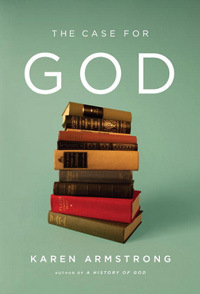Another Screed by Karen Armstrong

October 24, 2009

Okay, I'll confess up front that I have not read Karen Armstrong's latest book "The Case for God." I gave up reading Armstrong because her views of God generally and Christianity specifically are so reprehensible. She is a former nun with a chip on her shoulder the size of Texas. At least that's the way it seems when I read her.
I am posting a link to Tim Challies' review of the book because I am concerned that some who are not acquainted with Armstrong's work or her perspective will buy it thinking they are getting a good book on apologetics. Nothing could be further from the truth.
I am posting a link to Tim Challies' review of the book because I am concerned that some who are not acquainted with Armstrong's work or her perspective will buy it thinking they are getting a good book on apologetics. Nothing could be further from the truth.
I can save you thirty-five bucks and many hours of your life by telling you that 99% of what Armstrong has to say about God and religion she squeezes into the Introduction and the Epilogue, which together take up just 23 of the 340 pages of this book. There she spews forth what she really believes about God and those who seek to follow him. Though she writes about all faiths, she focuses almost exclusively on Christianity. The reader will learn, among other things: that nobody before modern times was foolish enough to believe that the Bible should be read as fact, as if the Creation account has any value beyond a mythological attempt to describe the world’s beginning; that the doctrine of the infallibility of Scripture was unknown until the 1870’s when Hodge and Warfield dreamed it up; that Socratic dialogue with atheists would help us understand how we can be more faithful believers in God; that truth is found not by understanding or believing, but by doing; that the purpose of religion is to discover new capacities of mind and heart; that the danger to religion and the danger to the world is not religious adherents, but fundamentalist believers-those who believe in the exclusivity of their faith and who fall into old beliefs such as the infallibility of their scriptures. And that is just a sampling of a mere 23 pages.Armstrong seems to have the same level of confidence in the Bible as some "evangelical" scholars I have read.
The rest of the book is an extended revisionist look at the history of religion in general and the Christian faith in particular. Armstrong seeks to show that the modern Christian God (I hesitate to capitalize God in the way she uses the name) is vastly different from the “unknown” God of pre-modern times. God was once mysterious and unknown, so transcendent, so other that people could not hope to really know who he is or how he acted. But then modernism had to come along and ruin a perfectly good deity by insisting that God could be known, that he even desired to be known. What the author believes we need to do, of course, is return to God as a mystery, to God as an unknowable force who combines the best of all the world religions. Along the way she pauses to offer a few words about nearly every religious leader and every philosopher who ever uttered God’s name. It is absolutely exhausting and, for simplistic old-school fundie Christians like myself, utterly exasperating. With her facts on the basics of the Christian faith so far from the truth and with her obvious bias, I actually found myself reading deliberately trying not to comprehend, not to retain, what she said. After all, having proven herself utterly untrustworthy in the basics, how could I trust her in anything else?
Read Tim's entire review HERE.




